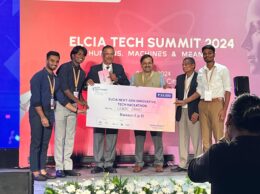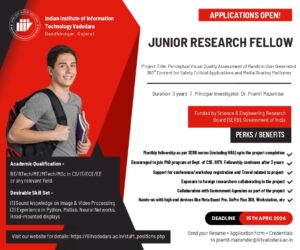Ms. Pavek engaged in a discussion with Prof. Sanjay Patro, Dean (Academics) at XLRI Jamshedpur, in addition to other members of the faculty. Prof. Patro informed Ms. Pavek about the diverse range of academic programs the institute offers. He also emphasized the institute’s robust worldwide alumni network. XLRI alumni occupy esteemed roles, including Chief Human Resources Officers, within some of the best companies globally. Furthermore, Prof. Patro pointed out that there are over 400 XLRI alumni residing in New York.
Ms. Pavek delved into the importance that President Biden and Prime Minister Modi were placing on collaboration between Indian and U.S. institutes of higher education, noting that government-to-government support for student and research exchanges were one area of effort that assisted the natural connections between schools created by Fulbright-Nehru alumni and Indian diaspora faculty working in U.S. universities. She shared ideas about other possibilities for fostering relationships and enhancing student exchange initiatives. Noting that there are currently more than 200,00 Indian students studying in the United States and developing have a good understanding of her nation, Ms. Pavek stated that U.S. Ambassador Eric Garcetti has a vision of more U.S. students coming to India for exchange programs of varying lengths to develop an understanding of the diversity, energy, and talents of India. The mutual benefits that active exchanges offer students from both nations facilitates their holistic growth.
“The differences between our educational systems and calendars — and especially how those differences create financial or logistical challenges for the students we seek to assist — need to be carefully assessed in our planning,” said Ms. Pavek. The Professors highlighted the substantial enthusiasm displayed by students in engaging with foreign universities and companies for summer internships and agreed that the disparity between Indian and U.S. academic calendars, specifically concerning semester schedules and summer internship timing, posed a challenge that hindered the overall process. They agreed to think creatively about how to overcome these challenges.
When asked by a professor “What causes delays in the U.S. visa application process? We, as professors, are unable to make urgent trips to the US.” In response, Ms. Pavek stated, “Educational and research collaboration exchanges are a priority for the U.S. Mission in India. The visa team has been actively working to increase the number of visa appointments available and also provides interview waiver appointments with a much shorter wait time than for first time applicants as well as emergency appointments for specific kinds of travel that could not be foreseen.” She encouraged people who are considering travel to the United States to book an appointment, even far into the future, and continue to monitor the website to self-prepone when earlier appointments are made available.
The faculty interaction was followed by US Consul General’s talk on “Challenges and Opportunities in Supply Chain Management” delivered to a dynamic and vibrant group of XLRI students. Ms. Pavek addressed the students and shared her journey of transition from a career in Supply Chain to one in Diplomacy. “Regardless of your field—supply chain, logistics, IT, Management, or any other— each skill you gain is a tool for overcoming challenges. Think of it as building a toolkit. The more you expand it, the better you’ll handle bigger opportunities and succeed. Don’t fear failure; every experience enriches your toolkit. Remember, every effort adds to your growth,” she said.
“The U.S. government and many U.S. businesses see India as a friendly partner in their global supply chains. American industries are keen to explore Indian partnerships. For these to succeed, mutual understanding is key; enhanced cultural exchange and encouraging Americans to explore India beyond the standard New Delhi-Agra-Jaipur-Mumbai tourism routes would allow more U.S. companies to approach doing business in India with more confidence and actualize India’s potential in the supply chain,” she added.
The Entrepreneurship-Cell of XLRI, a student entrepreneurship think tank, also discussed their Tribal Entrepreneurship Project with Ms. Pavek. They highlighted the potential of entrepreneurship among the tribal population of Jharkhand and presented a comprehensive analysis of business prospects in the region. The Consul General appreciated the commitment of students towards social responsibility and their initiatives in promoting tribal talent. Ms Pavek discussed the Dream Builder program run by the US Consulate Office to promote women entrepreneurs scale up their existing businesses. “About 500 women from 10 different states of India have interacted with our mentors and have gained the knowledge and skill of seeking funds and starting their own business,” she said.
The PEACE (People for Environmental Awareness and Conservation of Ecosystems) team of XLRI highlighted their initiatives in promoting sustainability awareness at XLRI and in Jharkhand. They discussed research on renewable energy, water management, and touched on topics like tribal community welfare. Additionally, they shared their experiences from XLRI’s distinctive “Rural Immersion Program,” where they lived in nearby villages to learn about local life and culture. Ms. Pavek applauded the work of both programs and noted that U.S. Consulate Kolkata has similar initiatives which could be opportunities for collaboration.
The US Consul General’s visit concluded at the Jesuit Father’s residence on campus where she was accompanied by Fr. Somy Matthew, SJ, Assistant, Dean [Administration and Finance]. There, she gained insight into XLRI’s history and learned about the significant roles of Jesuit Fathers in building education institutes in the tribal regions of Jharkhand and spreading the message of Magis, for Greater Good.






